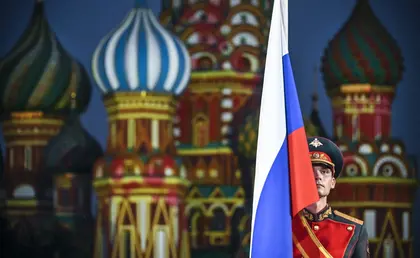Failing to shatter the USSR in 1991 and preventing the national republics from leaving it, (remember the “Chicken Kiev” speech of U.S. President George H.W. Bush), the West made a strategic mistake. It is too late to analyze the reasons for this misstep. What matters now is to avoid repeating it and to recover from this faux pas of 30 years.
The answer to the question “Why does Ukraine along with the Russian colonies need the immediate collapse of the ‘Russian empire’” is plain to see. It's time to answer the question “Why does Europe, and the Western world in general, need Russia to fall into oblivion?”
JOIN US ON TELEGRAM
Follow our coverage of the war on the @Kyivpost_official.
After the collapse of the USSR, “Greater Europe” benefited from 30 years of development, regional security and economic prosperity. From 1991 to 2014 (up to when the Russian Federation attacked Ukraine), the European Union (EU) expanded eastward to the joy of its new members, and the combined GDP of member states increased threefold.
Progress has been achieved by reallocating funds from European defense budgets to boosting the economy. With the growth of military budgets by an average of 30 percent, GDP per capita in Europe doubled.
After the collapse of the USSR, European countries made another strategic mistake when establishing commercial contacts, primarily for energy supplies, with a sole actor – Russia. As a result, the 2021 energy crisis erupted.

Moscow Claims AFU’s Best Troops ‘Ground Down’, Kyiv’s 2025 War Plans ‘Derailed’
Needless to say, by pitching into the collapse of the Russian Federation, “Greater Europe” stands to benefit even more. Instead of one monopoly partner in the energy sector and the “dictatorship of the seller,” Europe would be able to cultivate a plethora of competing states and a tangible cost reduction for energy resources.
Among the former Soviet republics, the EU has so far established strong economic ties with Kazakhstan. The trade balance with Astana is growing, as is the volume of investments. European and U.S. companies are actively involved in oil and gas field development in the republic.
Unfortunately, the EU did not pay enough attention to other states in Central Asia and the Caucasus. In Azerbaijan, Europe is mainly represented by the French company TotalEnergies. Activity with Turkmenistan only began in 2019. Now Europe is catching up. Let's imagine that, besides Turkmenistan, Uzbekistan, Azerbaijan, Tatarstan, Tyva, Yakutia or, the “Republic of Siberia” with its almost inexhaustible natural resources also joins the European Central Counterparties.
The China problem
The preservation of Russia in its current status of a “canned empire” risks promulgating the uncontrollable rise of China. In the wake of the ongoing war, which has grown into a virtual confrontation between the Russian Federation and the entire Western democratic world, Moscow is already becoming Beijing’s satellite. The outcome would be a huge Russian version of North Korea, with unlimited resources exploited exclusively by China. This is already a direct threat to Western democracies and an ace in the hole in the upcoming confrontation between the two worlds.
On the other hand, Khanty-Mansiysk, Khabarovsk, Sakhalin, and the entire Far East, having strong ties with the EU, the U.S., Japan and/or South Korea and Western investments, are unlikely to be interested in any long-term relations with China. Accordingly, these future republics, with their own resources, could aid the democratic world rather than Chinese President Xi Jinping’s communist dictatorship. China, instead of unlimited access to resources, would get democratic countries on its borders and, quite possibly, NATO military bases.
Leaving nuclear weapons in the hands of the Russian Federation 30 years ago, the civilized world gave birth to a sick terrorist state with a monopoly over their use. The collapse of Russia – in a nutshell – would bring peace to the European continent again. This, in turn, means Europe would get opportunities to invest more in the economy, instead of the arms race.
Only after the collapse of the “Russian empire,” its occupied territories would finally get rid of the burden of nuclear weapons. The governments of the new states would exchange their nuclear arsenal for recognition of their legitimacy and sovereignty by the democratic world.
This is what happened with Ukraine, Belarus, and Kazakhstan during the collapse of the USSR. The Russian republic of Buryatia, technically, has no reason, and no need, to maintain a nuclear arsenal. Fighting with Tyva then? What for? After the fall of the “Russian empire,” the Doomsday Clock could finally be set back a few minutes.
Only after the collapse of Russia, Ukraine stands to get restitution for war damages. The condition for recognizing the sovereignty of the new states should be a global pledge to pay reparations to Kyiv. This could be done for example, by deducting 10-15 percent of the export of raw materials (under the control of the global community) in favor of Ukraine. Europe and the U.S., in turn, will be able to act as strategic investors in the recovery program.
Last but not least – only after the collapse of the “Russian empire,” a tribunal can be held for war criminals. If Russia retains its current status, those criminals will escape justice by receiving suspended sentences, as happened with the perpetrators responsible for the Dutch Boeing MH17 plane crash killing 298 passengers in Donbas, or war criminals during the Russian-Georgian conflict.
Let’s cut Russia down to size! It’s time!
Oleh Dunda has served as a People's Deputy of Ukraine since 2019, with the Servant of the People Party.
The views expressed are the author’s and not necessarily of Kyiv Post.
You can also highlight the text and press Ctrl + Enter






